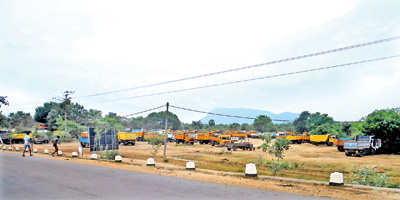News
Illegal sand miners given licence to dig environmental grave
Suspending sand transport licences has paved the way for more environmental damage through illegal mining, which is continuing.

Sand mining taking place in Manampitiya area. Pic by J.A. Jayakody
The requirement was suspended in December amid a public outcry over its adverse consequences.
Lawyer and environmental protection activist, Jagath Gunawardena, said the controversial decision to suspend licences was illegal.
According to the Mines and Minerals Act, a permit is needed to mine and transport sand, he added.
He said the law had not been amended despite the Cabinet decision.
Environmentalists point out that sand is needed in construction work, while the environment needs to be protected.
Recent incidents have been reported in Manampitiya area as contractors have started mining near Maduru Oya.
Residents have complained that a company is dredging a reservoir for sand. They claimed the company has struck a deal with government authorities and sells sand for Rs 35,000 a cube which they extract for about Rs 2,000.
Lawyer, Nimmi Sanjeewani, said mining is regulated under and the Minerals Act No 33 of 1992 as amended by Act No 66 of 2009.
Geological Survey and Mines Bureau (GSMB) was established under this Act. The GSMB issues three types of licences; exploration, mining, trading and transport to regulate the exploration for mining, transport, processing, trading and export of minerals. This license system can regulate sand mining.
Monitoring a transport licence is a legal requirement under the Mines and Minerals Act. As a result, illegal mining activities have been controlled through the permit. The law cannot be suppressed blatantly by a Cabinet decision without an amendment to the Act
Undue political interference, lack of officers to enforce the law across the country, transparency and accountability are some other issues not well addressed by statutory laws.
In instances where statutory regulations do not work, public interest litigation plays a vital role in protecting the environment.
Ms Sanjeewani, said that for the sake of sustainable development, “the responsible authorities need to act with accountability”.
Also, they should consider opinions from experts before taking decisions in relation to sensitive environmental issues such as sand mining.

